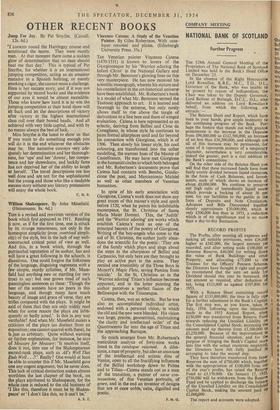William Shakespeare. By John Masefield. (Heinemann. 8s. 6d.) William Shakespeare.
By John Masefield. (Heinemann. 8s. 6d.) THIS is a revised and rewritten version of the book which first appeared in 1911. Reading it now, as if for the first time, one is struck by its strange remoteness, not only in the homespun simplicity (even contrived simpli- city) of the style, but in the lack of any well- constructed critical point of view as well. And this, in a book which, through the patriarchal reputation of its author, has and will have a great following in the schools, is disastrous. One could forgive the folksiness Of the language, disguising vagueness with a few simple, sturdy syllables, if Mr. Mase- field had anything new or startling (or very true) to say: but one grows tired of such meaningless sentences as these: 'Though the best of the sonnets have no peers in this language, and though many have much beauty of image and grace of verse, they are trifles compared with the plays. It might be said of them that they are only widely read when for some reason the plays are infre- quently or badly acted.' Is this in any way verifiable? And when Mr. Masefield makes a criticism of the plays (as distinct from an Exposition; one cannot quarrel with these), he Is just as arbitrary. Quite without warning or further explanation, for instance, he says of Measure for Measure: 'It resolves itself, does it not, into one of the Shakespearean second-rank plays, such as All's Well That gnds Well . . .?' Really? One would at least be able to counter this if Mr. Masefield gave one any cogent argument, but he never does. This lack of critical distinction makes almost worthless the last chapter of the book, on the plays attributed to Shakespeare, for the whole case is reduced to the old business of 'I like this, therefore it must be by Shakes- peare' or'! don't like this, so it can't be.'
A. S. T.


























 Previous page
Previous page